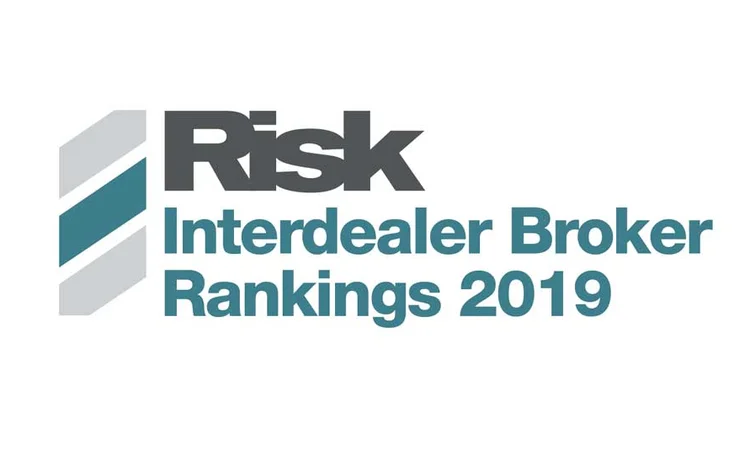
Interdealer broker rankings 2019: the story behind the votes
Volumes in decline, while start-ups pose increasing threat

CLICK HERE TO VIEW ALL THE TABLES
Risk’s annual rankings of interdealer brokers – voted for by their clients – tells the story of this important, imperilled sector in more ways than one.
First, it shows a degree of stability in the biggest over-the-counter products, with Icap retaining its top spot for interest rate derivatives, and the rest of last year’s leading rates brokers filling out of the top five. Sunrise continues to fend off Square Global Markets for the hotly contested equity derivatives crown. In foreign exchange, two of last year’s top three remain the same in 2019.

That’s what you’d expect from a market that has consolidated significantly in recent years.
But the rankings tell that story in a less obvious way as well. Over the years, dozens of products that were – and still are – handled by brokers have vanished from the rankings. In each case, that is because there weren’t enough votes to produce a meaningful snapshot of customer sentiment.
This year, inflation swaps and options didn’t make the cut; credit derivatives and structured credit have repeatedly failed to garner sufficient interest in the post-crisis years. In the foreign exchange categories, swaps, options and forwards – which were broken down by currency pair – have been consolidated to offer a view of top brokers by currency, rather than by product. That may not be the ideal way to view the market, but it’s the only one that was possible given the number of votes.
Again, consolidation is one reason. Another may be dealers’ attempts to risk-manage client trades within the franchise – internalisation – rather than turning to the broker market for an immediate hedge.
Votes were abundant in the equity derivatives categories, however, resulting in a set of rankings that contains 17 separate equities tables. In part, this reflects fierce competition between the two survey’s two pre-eminent firms – Sunrise Brokers bagged a total of 13 firsts in these categories, with Square Global Markets taking one win and 12 further second or third places.
Competition between these smaller brands – and the resulting torrent of votes – meant the number of equities products in this year’s rankings actually increased, to include funds derivatives and dividend options.
The next chapters in this story are only hinted at. On top of a decline in volumes, brokers are now being threatened by start-ups who want to match market participants without employing ranks of expensive, human intermediators. For years, the incumbent firms have been expanding into buy-side broking, data and post-trade – so, perhaps the traditional categories continue to wither.
How the poll was conducted
In total, Risk.net received 291 valid responses for this year’s rankings, primarily divided between Europe (67%), North America (19.2%) and Asia-Pacific (13.7%).
The broker rankings cover instruments in interest rates, foreign exchange and equity derivatives. Participants were asked to vote for their top broker in each instrument, based on the criteria most important to them.
As always, the poll is not designed to reflect volumes traded in any particular market and is therefore not a direct reflection of market share – voters are able to base their decisions on a variety of criteria, including cost, liquidity provision, technology support and reliability. In that sense, this poll should be considered a reflection of how banks view brokers in terms of overall quality of service.
When aggregating the results, we strip out what we consider to be invalid votes. These include people voting for their own firm, multiple votes from the same person or IP address, votes by people who clearly do not trade the product, votes that select the same firm indiscriminately throughout the survey, and block votes from groups of people on the same desk at the same institution. The editor’s decision on the validity of the votes is final.
The survey also includes asset class leaderboards – showing the top brokers in rates, foreign exchange and equities – which are calculated by aggregating the total number of votes across individual categories. These overall results are naturally weighted, as there are more votes in some categories than others.
Only users who have a paid subscription or are part of a corporate subscription are able to print or copy content.
To access these options, along with all other subscription benefits, please contact info@risk.net or view our subscription options here: http://subscriptions.risk.net/subscribe
You are currently unable to print this content. Please contact info@risk.net to find out more.
You are currently unable to copy this content. Please contact info@risk.net to find out more.
Copyright Infopro Digital Limited. All rights reserved.
As outlined in our terms and conditions, https://www.infopro-digital.com/terms-and-conditions/subscriptions/ (point 2.4), printing is limited to a single copy.
If you would like to purchase additional rights please email info@risk.net
Copyright Infopro Digital Limited. All rights reserved.
You may share this content using our article tools. As outlined in our terms and conditions, https://www.infopro-digital.com/terms-and-conditions/subscriptions/ (clause 2.4), an Authorised User may only make one copy of the materials for their own personal use. You must also comply with the restrictions in clause 2.5.
If you would like to purchase additional rights please email info@risk.net
More on Rankings
TP ICAP: leveraging a unique vantage point
Market intelligence is key as energy traders focus on short-term trading amid uncertainty
GEN-I: a journey of ongoing growth
GEN-I has been expanding across Europe since 2005 and is preparing to expand its presence globally
Bridging the risk appetite gap
Axpo bridges time and risk appetite gaps between producers and consumers
Axpo outperforms in the Commodity Rankings 2024
Energy market participants give recognition to the Swiss utility as it brings competitive pricing and liquidity to embattled gas and power markets
Hitachi Energy supports clients with broad offering
Hitachi Energy’s wide portfolio spans support for planning, building and operating assets. Energy Risk speaks to the vendor about how this has contributed to its strong Software Rankings performance in 2024
Market disruptions cause energy firms to seek advanced analytics, modelling and risk management capabilities
Geopolitical unrest and global economic uncertainty have caused multiple disruptions to energy markets in recent years, creating havoc for traders and other companies sourcing, supplying and moving commodities around the world
ENGIE empowers clients globally to decarbonise and address the energy transition
In recent months, energy market participants have faced extreme volatility, soaring energy prices and supply disruptions following Russia’s 2022 invasion of Ukraine. At the same time, they have needed to identify and mitigate the longer-term risks of the…
Beacon’s unique open architecture underlies its strong performance
Recent turmoil in energy markets, coupled with the longer-term structural changes of the energy transition, has created a raft of new challenges for market participants







